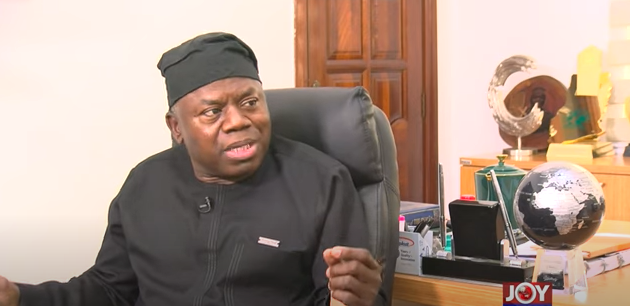Former President of the Ghana Association of Banks, Alhassan Andani, says commercial banks should not be faulted for selling cocoa bills to customers.
According to him, the cocoa bills were one of the safest bond instruments on the market and thus a preferred choice for customers who wanted very low risk bonds to buy.
He explained that what made the cocoa bills particularly enticing was the fact that COCOBOD, the issuer, has a better credit risk than the government of Ghana, making it a very credible institution.
“First of all, let’s not miss it. What is the credit rating of cocoa bill? I have been in 14 COCOBOD syndications, 14 international syndications as a lead player. And I always said how come that COCOBOD has a better credit risk than the government of Ghana which owns it a 100%.
“And it was simple, because of course they sold cocoa in US dollars which was externalized and the borrowers sat around the money before it comes into Ghana. So COCOBOD borrowed sometimes at best rates, I mean, 67 basis points was the highest I saw in a very long run.
“Otherwise they were borrowing at 15, 25, 30 basis points above LIBOR ( London Interbank Offered Rate) when Ghana government itself was borrowing at 8 above LIBOR or 7 above LIBOR. Think about it,” he said on JoyNews’ PM Express Business Edition on Thursday.
He noted that allowing debt on the cocoa bills was what led to the current situation.
His comments follow the Bank of Ghana directing banks not to pay customers their maturing cocoa bills investments following cash flow challenges facing COCOBOD.
In a statement, the Central Bank said it expects that this short-term cash flow challenges facing COCOBOD will be resolved soon to enable the cocoa regulator meet its obligations to investors.
In a recent statement, the Bank of Ghana, Ghana Cocoa Board (COCOBOD) and the commercial banks have agreed to allow banks to use COCOBOD’s deposits/placements at the banks to cater for retail customers who may not want a rollover of their cocoa bills.
According to Alhassan Andani, “So COCOBOD and cocoa bills that’s a kind of risk instrument you don’t want any debt on, and we should have done everything possible to prevent that. Not who bought it and who didn’t buy it. It wasn’t a weekly packaged deal, the subprime you’re talking about was a lot of rotten debt hidden into a credit package when you start to unpack.
“This is a very credible institution that as I said in the international market was rated better than the Ghana government. So if they have a bond and the bank bought it and even had clients who had wanted very safe bonds and you recommend it to them to buy, really did you do anything wrong?
“So let’s not divert the issue. What has happened to hurt the credibility of COCOBOD or the COCOBOD bills which were really really highly rated? That’s what we should be looking at,” he said.
Latest Stories
-
AI, automation, and the future of threat intelligence
14 minutes -
Partey defends Kudus after challenging season at West Ham
51 minutes -
Police arrest man with 40 parcels of suspected narcotics on Accra-Somanya highway
1 hour -
Joy Prime to premiere “PrimeTime” with George Quaye on June 18
3 hours -
Israel carrying out ‘extensive strikes’ across Iran as Tehran warns ‘more severe’ response coming
3 hours -
Government suspends GH₵1 fuel levy indefinitely, new date to be announced later
4 hours -
Democratic state politician and husband shot dead in targeted attack
4 hours -
15 killed by Israeli fire near Gaza aid site, hospitals say
4 hours -
Ashaiman NDC in shock as chairman Shaddad Jallo dies
5 hours -
Mahama converts Daboya College into public Teacher Training Institution, revives Doli project
5 hours -
Prioritise prudence, not foreign debt – Deputy Ahafo Regional Imam implores African leaders
5 hours -
Mahama promises STEM School and TVET Centre for Savannah Region
5 hours -
Mahama announces new public university for Savannah Region
5 hours -
Ahiagbah demands Health Minister’s dismissal over handling of nurses’ strike
5 hours -
Mahama’s clemency for radio stations was pure gimmick – Egyapa Mercer
5 hours

